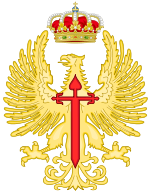Spanish army
|
Ejército de Tierra Spanish Army |
|
|---|---|

Seal of the Spanish Army
|
|
| Founded | 15th century – present |
| Country |
|
| Allegiance | Felipe VI |
| Type | Army |
| Role | Land force |
| Size | 74,661 personnel (2012) |
| Part of | Spanish Ministry of Defense |
| Garrison/HQ | Buenavista Palace, Madrid |
| Mascot(s) | Crowned rampant eagle with Saint James cross |
| Commanders | |
| Chief of Army Staff | General Jaime Domínguez Buj |
| Commander in Chief | King Felipe VI |
| Aircraft flown | |
| Attack helicopter | Tiger |
| Reconnaissance | MBB Bo 105 |
| Trainer |
Colibrí EC135 |
| Transport |
Chinook Cougar NH90 |
The Spanish Army (Spanish: Ejército de Tierra; lit. "Army of the Land/Ground") is the terrestrial army of the Spanish Armed Forces responsible for land-based military operations. It is one of the oldest active armies - dating back to the late 15th century.
The Spanish army has existed continuously since the reign of King Ferdinand and Queen Isabella (late 15th century). The oldest and largest of the three services, its mission was the defense of peninsular Spain, the Balearic Islands, the Canary Islands, Melilla, Ceuta and the Spanish islands and rocks off the northern coast of Africa.
During the 16th century, Habsburg Spain saw a steady growth in its military power. The Italian Wars (1494–1559) resulted in an ultimate Spanish victory and hegemony in northern Italy by expelling the French. During the war, the Spanish army transformed its organization and tactics, evolving from a primarily pike and halberd wielding force into the first pike and shot formation of arquebusiers and pikemen, known as the colunella. During the 16th century this formation evolved into the tercio infantry formation. The new formation and battle tactics were developed because of Spain's inability to field sufficient cavalry forces to face the heavy French cavalry.
Backed by the financial resources drawn from the Americas, Spain could afford to mount lengthy campaigns against her enemies, such as the long running Dutch revolt (1568–1609), defending Christian Europe from Ottoman raids and invasions, supporting the Catholic cause in the French civil wars and fighting England during the Anglo-Spanish War (1585–1604). The Spanish army grew in size from around 20,000 in the 1470s, to around 300,000 by the 1630s during the Thirty Years' War that tore Europe apart, requiring the recruitment of soldiers from across Europe. With such numbers involved, Spain had trouble funding the war effort on so many fronts. The non-payment of troops led to many mutinies and events such as the Sack of Antwerp (1576), when unpaid tercio units looted the Dutch city.
...
Wikipedia
